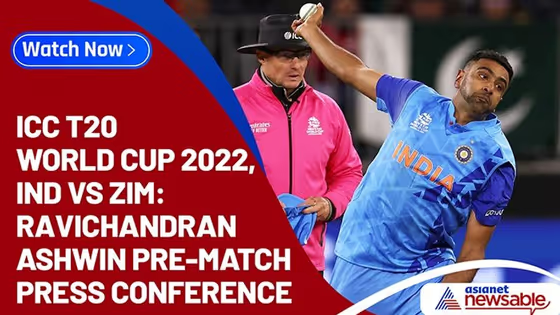
ICC T20 World Cup 2022: R Ashwin feels players don't need to innately believe in match-ups
India off-spinner Ravichandran Ashwin is thorough with his processes and doesn't want to depend too much on match-ups, which has become a vogue in T20 cricket.
Indian off-spinner Ravichandran Ashwin is methodical in his approach and avoids depending too much on match-ups, which has become fashionable in T20 cricket. Rahul Dravid, the head coach of India, is a strong believer in match-ups, and recently, Men In Blue have become a more data-driven side under the former India captain.

"I don't think players innately have to necessarily believe in matchups, but I think it's an area that teams and tactical edges are happening around," Ashwin said during the pre-match press conference ahead of India's clash against Zimbabwe in the ICC T20 World Cup 2022 in Melbourne.
Match-Ups is a concept where a side chooses which bowler has a clear advantage over a specific batter or which batter at a specific point in the game is more valuable based on data.
"I think it's safe to say that one end of the spectrum is to plan for all those things (match-ups), but as a bowler you need to constantly bowl to a lot of batters," he said.
The Indian off-spinner doesn't believe that one particular bowler should bowl to one particular batter.
"I think it is a feature that's existing, and it is definitely being developed. As a playing unit, to only believe in that and say this guy will bowl to this person, you can't work like that. But I think it's giving a tactical edge to teams," Ashwin agreed.
As a bowler, one needs to know what exactly are the pressure points.
"You need to constantly know where the Achilles heels are and work on it and try and get better. You want to add that to your skills, be it with the bat or the ball," he added.
Since India has never played international cricket in Australia during a true winter, Ashwin lacks a frame of reference to know what to anticipate.
"It would be unfair to say it's different or it's anything because we've never come to Australia this time of the year. Generally, when it comes to the sport itself, conditions are king. So, you need to understand that this is what is being presented in front of you," he said.
Also read: 'It's nice to cut a cake at the MCG' - Virat Kohli on his 34th birthday celebrations
While there is no end to the amount of analysis and strategic dissection that can be done, Ashwin, for one, thinks that the quickest format scarcely gives anyone time to ponder.
"Like I said, T20 is one sport where you need to adapt quickly and also respond quickly. You don't have the time or the band width to be able to think, assess, and deliver. The time spans are very short."
India's team has been travelling from one place to another due to commercial pressures, unlike teams like Sri Lanka, Australia, or England who have had the opportunity to play at least two games in one specific location.
"Some other teams have managed to stay in one venue and play at a certain venue a couple of times, which Indian team hasn't had the luxury of doing and rightly so. There are a lot of Indian people around the country that want to watch the game, so it's understandable," Ashwin sighted the practical problems.
In these conditions, it is the Indian fast bowlers, who have set the tone as Ashwin has taken 3 wickets in 4 games.
"Pretty much the roles have been the fast bowlers have set the tone. As a spinner coming in the back half 9th or 10th and then doing the job for the back end is a role that we have to adapt to," Indian team's resident Cricket Scientist' said.
And Ashwin, on his own admission, is happy with the role of bowling at the back-end of the innings.
"It's not like I haven't done that role before. It happens in the IPL now and then. So, the demands of the game, what the situation is and what you have to deliver for the team is exactly what adaptations call."
(With inputs from PTI)